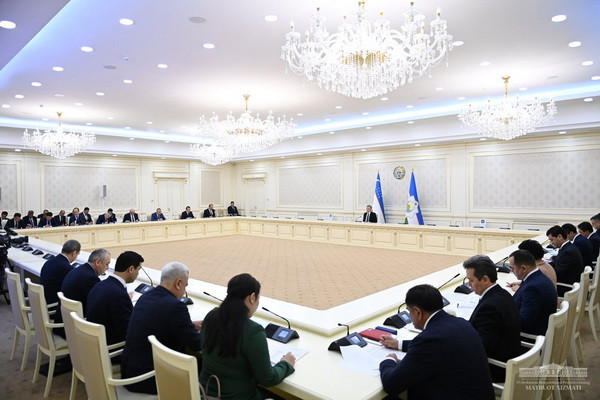
Shavkat Mirziyoyev: Our people trust us with the most precious thing - children
Tashkent, Uzbekistan (UzDaily.com) -- On 5 April, President of Uzbekistan Shavkat Mirziyoyev chaired a videoconference to analyze the effectiveness of reforms in the field of public education.
The development of human capital is one of the seven priorities of the Development Strategy of Uzbekistan. At the meeting held on 28 January 2022, issues in this area were discussed and many tasks were identified.
Over the past two months, responsible persons have traveled to all regions to study the problems on the ground. It was revealed that in 852 schools of the country there are extremely low indicators of the quality of education, the potential of teachers and the admission of graduates to universities.
Advanced methods have been introduced in Presidential, specialized and private schools. But the biggest problem of other schools is that the teaching methods are outdated. There are no initiatives to introduce modern teaching methods into them.
Despite the allocation of funds to equip schools with computers, work in the Republic of Karakalpakstan, Andijan, Jizzakh, Kashkadarya, Namangan and Tashkent regions is progressing slowly. The quality of education in schools in remote areas is unsatisfactory.
As you know, at the beginning of the year councils were formed to reform school education. The chairmen of local councils are khokims of regions, districts and cities. Therefore, khokims of regions with a low level of education received a warning.
The head of state announced the launch of a nationwide project to retrain school teachers based on new methods.
According to this new system, in the next 3-4 years, all teachers in schools will be trained on the basis of a new methodology. To this end, on the basis of advanced training centers in each region, National Training Centers will be established to train teachers in new methods. The most qualified foreign specialists in the field of exact and natural sciences will be involved in them.
In each region, a "group of trainers" will be formed to improve the skills of school teachers in the field. They will be paid wage increases of up to 100 percent.
By the end of the year, khokimiyats, together with the Ministry of Public Education, will begin to introduce advanced methods in at least 20 percent of schools in each district and city. An additional US$100 million will be allocated to implement this new system.
Also, the Abdulla Avloni Institute will be reorganized into the Republican National Education Center and merged into a single system with the Tashkent State Pedagogical University.
In general, the system of teaching new methods will begin with the National Education Center and the Tashkent State Pedagogical University. The university will be transferred to the Ministry of Public Education and will become the base institution for the training and retraining of school teachers in the country.
Pedagogical institutes operating in the regions will be gradually separated from universities and turned into independent educational institutions.
Particular attention at the meeting was paid to the education of young people. Delivered
the task is to develop a new concept of cardinal improvement of the spiritual situation in schools.
The need to review the requirements for propagandists of spirituality in schools, the appointment of persons with high authority in the mahalla and the team, and the encouragement of exemplary students and parents was indicated.
Today, 120 schools in the country work on the third and fourth coefficients. That is, the number of students far exceeds the capacity. The President gave instructions to improve the conditions in such schools.
It was noted that by the beginning of the next academic year, 960 schools will be provided with computer classes, and 740 will be re-equipped.
It is planned to adopt a separate program to update more than 5,000 computer classes. For this, 200 billion soums will be allocated from the republican budget, and another 200 billion soums from local budgets.
The Ministry for the Development of Information Technologies and Communications has been tasked with opening special preferential tariffs for schools, increasing the Internet speed in schools up to 100 megabits per second, depending on the number of students.
Both education and the environment in the school largely depend on the directors. Therefore, it is necessary to introduce a system of certification of school directors from the new academic year. From now on, candidates for the post of director will be selected through this system.
The head of state noted the need to develop the teaching of natural and exact sciences. On the basis of 193 educational institutions, it is planned to organize schools with an emphasis on natural and exact sciences. Khokims were instructed to repair these schools and create all conditions.
At the meeting, ministers and khokims, school directors expressed their views and proposals.